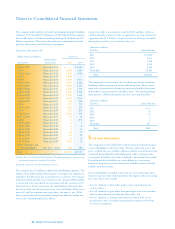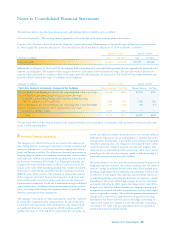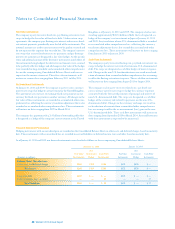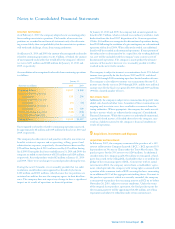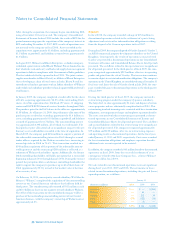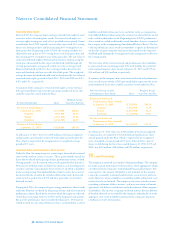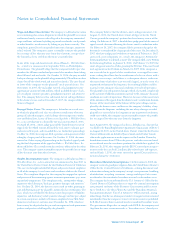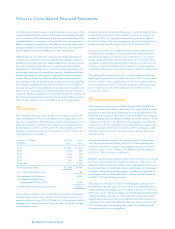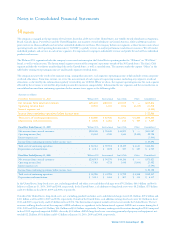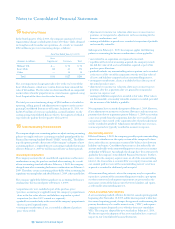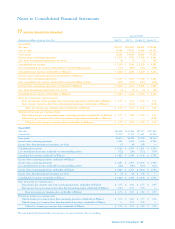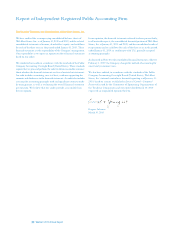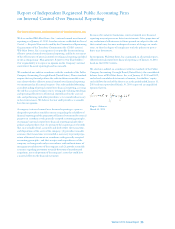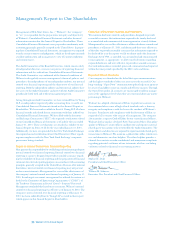Walmart 2010 Annual Report Download - page 49
Download and view the complete annual report
Please find page 49 of the 2010 Walmart annual report below. You can navigate through the pages in the report by either clicking on the pages listed below, or by using the keyword search tool below to find specific information within the annual report.Wage-and-Hour Class Actions: The company is a defendant in various
cases containing class-action allegations in which the plaintiffs are current
and former hourly associates who allege that the company committed
wage-and-hour violations by failing to provide rest breaks, meal periods,
or other benefits, or otherwise by failing to pay them correctly. The
complaints generally seek unspecified monetary damages, injunctive
relief, or both. The company cannot reasonably estimate the possible
loss or range of loss that may arise from these lawsuits, except where
the lawsuit has been settled or otherwise as noted below.
In one of the wage-and-hour lawsuits, Braun/Hummel v. Wal-Mart Stores,
Inc., a trial was commenced in September 2006, in Philadelphia,
Pennsylvania. The plaintiffs allege that the company failed to pay class
members for all hours worked and prevented class members from taking
their full meal and rest breaks. On October 13, 2006, the jury awarded
back-pay damages to the plaintiffs of approximately $78 million on their
claims for off-the-clock work and missed rest breaks. The jury found
in favor of the company on the plaintiffs’ meal-period claims. On
November 14, 2007, the trial judge entered a final judgment in the
approximate amount of $188 million, which included the jury’s back-
pay award plus statutory penalties, prejudgment interest and attorneys’
fees. The company believes it has substantial factual and legal defenses
to the claims at issue, and on December 7, 2007, the company filed its
Notice of Appeal.
Exempt Status Cases: The company is a defendant in several cases
in which the plaintiffs seek class or collective certification of various
groups of salaried managers, and challenge their exempt status under
state and federal laws. In one of those cases (Sepulveda v. Wal-Mart Stores,
Inc.), class certification was denied by the trial court on May 5, 2006.
On April 25, 2008, a three-judge panel of the United States Court of
Appeals for the Ninth Circuit affirmed the trial court’s ruling in part
and reversed it in part, and remanded the case for further proceedings.
On May 16, 2008, the company filed a petition seeking review of that
ruling by a larger panel of the court. On October 10, 2008, the court
entered an Order staying all proceedings in the Sepulveda appeal pend-
ing the final disposition of the appeal in Dukes v. Wal-Mart Stores, Inc.,
discussed below. Class certification has not been addressed in the other
cases. The company cannot reasonably estimate the possible loss or range
of loss that may arise from these lawsuits.
Gender Discrimination Cases: The company is a defendant in Dukes v.
Wal-Mart Stores, Inc., a class-action lawsuit commenced in June 2001 in
the United States District Court for the Northern District of California.
The case was brought on behalf of all past and present female employees
in all of the company’s retail stores and warehouse clubs in the United
States. The complaint alleges that the company has engaged in a pattern
and practice of discriminating against women in promotions, pay, train-
ing and job assignments. The complaint seeks, among other things,
injunctive relief, front pay, back pay, punitive damages and attorneys’
fees. On June 21, 2004, the district court issued an order granting in
part and denying in part the plaintiffs’ motion for class certification. The
class, which was certified by the district court for purposes of liability,
injunctive and declaratory relief, punitive damages and lost pay, subject
to certain exceptions, includes all women employed at any Wal-Mart
domestic retail store at any time since December 26, 1998, who have
been or may be subjected to the pay and management track promotions
policies and practices challenged by the plaintiffs.
The company believes that the district court’s ruling is incorrect. On
August 31, 2004, the United States Court of Appeals for the Ninth
Circuit granted the company’s petition for discretionary review of the
ruling. On February 6, 2007, a divided three-judge panel of the court of
appeals issued a decision affirming the district court’s certification order.
On February 20, 2007, the company filed a petition asking that the
decision be reconsidered by a larger panel of the court. On December 11,
2007, the three-judge panel withdrew its opinion of February 6, 2007,
and issued a revised opinion. As a result, the company’s Petition for
Rehearing En Banc was denied as moot. The company filed a new Petition
for Rehearing En Banc on January 8, 2008. On February 13, 2009, the
court of appeals issued an Order granting the Petition. The court heard
oral argument on the Petition on March 24, 2009. If the company is
not successful in its appeal of class certification, or an appellate court
issues a ruling that allows for the certification of a class or classes with a
different size or scope, and if there is a subsequent adverse verdict on
the merits from which there is no successful appeal, or in the event of a
negotiated settlement of the litigation, the resulting liability could be
material to the company’s financial condition or results of operations.
The plaintiffs also seek punitive damages which, if awarded, could result
in the payment of additional amounts material to the company’s financial
condition or results of operations. However, because of the uncertainty
of the outcome of the appeal from the district court’s certification decision,
because of the uncertainty of the balance of the proceedings contem-
plated by the district court, and because the company’s liability, if any,
arising from the litigation, including the size of any damages award if
plaintiffs are successful in the litigation or any negotiated settlement,
could vary widely, the company cannot reasonably estimate the possible
loss or range of loss that may arise from the litigation.
Since August 2001, the company has been a defendant in a lawsuit that
was filed by the Equal Employment Opportunity Commission (“EEOC”)
on August 24, 2001, in the United States District Court for the Eastern
District of Kentucky on behalf of Janice Smith and all other females
who made application or transfer requests at the London, Kentucky,
distribution center from 1998 to the present, and who were not hired
or transferred into the warehouse positions for which they applied. On
February 26, 2010, the company and the EEOC entered into an agree-
ment to settle the case for $12 million, plus related taxes and expenses,
and on March 1, 2010, the court entered an agreed Consent Decree
memorializing the settlement.
Hazardous Materials Investigations: On November 8, 2005, the
company received a grand jury subpoena from the United States Attorney’s
Office for the Central District of California, seeking documents and
information relating to the company’s receipt, transportation, handling,
identification, recycling, treatment, storage and disposal of certain
merchandise that constitutes hazardous materials or hazardous waste.
The company has been informed by the U.S. Attorney’s Office for the
Central District of California that it is a target of a criminal investigation
into potential violations of the Resource Conservation and Recovery
Act (“RCRA”), the Clean Water Act and the Hazardous Materials
Transportation Statute. This U.S. Attorney’s Office contends, among
other things, that the use of company trucks to transport certain returned
merchandise from the company’s stores to its return centers is prohibited
by RCRA because those materials may be considered hazardous waste.
The government alleges that, to comply with RCRA, the company must
ship from the store certain materials as “hazardous waste” directly to a
Notes to Consolidated Financial Statements
Walmart 2010 Annual Report 47



